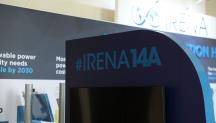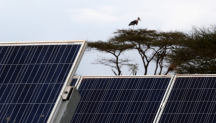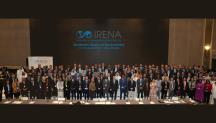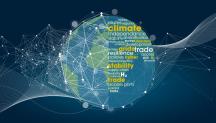
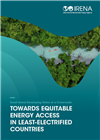
-
-
IRENA (2024), Small Island States at a Crossroads: Towards equitable energy access in least-electrified countries, International Renewable Energy Agency, Abu Dhabi.
Copied
https://mc-cd8320d4-36a1-40ac-83cc-3389-cdn-endpoint.azureedge.net/-/media/Files/IRENA/Agency/Publication/2024/Mar/IRENA_SIDS_crossroads_energy_access_2024.pdf?rev=fd170581bb4149ef8b96ab5ad6abf910
Copied
Small Island Developing States at a Crossroads: Towards equitable energy access in least-electrified countries
Newsletter
Small Island Developing States (SIDS) account for less than 1% of global greenhouse gas emissions, and yet they are home to some of the world’s most climate-vulnerable populations, making action to mitigate global heating urgent.
Renewables hold substantial promise for SIDS. Beyond carbon emissions reductions, they are clean, cost-effective sources of energy that make energy systems more resilient in the face of extreme weather events and other disruptions.
Small Island Developing States at a Crossroads: Towards equitable energy access in least-electrified countries focuses on SIDS contexts with significant unelectrified populations that face economic vulnerabilities exacerbated by poverty, food insecurity, water-borne illness, lack of healthcare, volatile agriculture, deforestation, and climate vulnerabilities. The least-electrified SIDS are now at a crossroads to meet universal energy access. Instead of increasing access through imported fossil fuels, they can pursue decentralised renewable energy solutions, with significant economic, well-being, health, and environmental gains to be had. The report offers case studies on Guinea-Bissau, Papua New Guinea, and Vanuatu.
Local practitioners of decentralised renewable energy solutions in least-electrified SIDS have started to establish local value chains for electricity generation using biomass gasification, small-scale hydro, and solar PV. Customised capacity building and results-based finance that strengthens local manufacturing of renewable energy components, as well as small-scale agri-processing equipment, will enable accelerated uptake of reliable and affordable clean energy solutions. Also, decentralised renewable energy value chains and productive end uses have been proven to provide rural women opportunities for increased income generation, reduced physical drudgery, reduced indoor air pollution from cooking, and increased access to higher quality healthcare.
